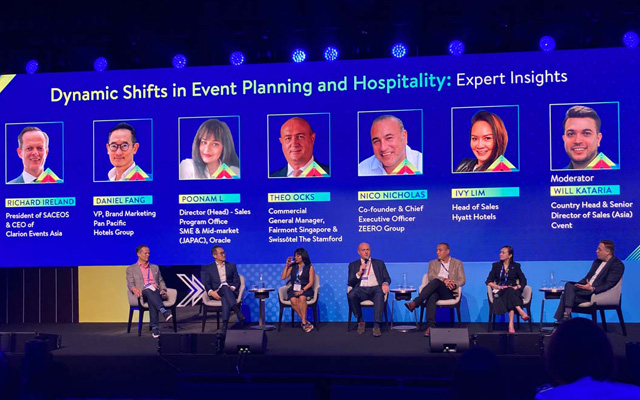The events industry is witnessing dynamic shifts with attendees having to focus on their return of investment (ROI) due to more challenging business conditions and exhibitors having to be on top of innovative solutions.
Richard Ireland, president of the Singapore Association of Convention & Exhibition Organisers & Suppliers and CEO of Clarion Events Asia, gave the example of the Singapore Tourism Board now taking a “receipts not numbers focus”, as the city continues to meet demand, invest in infrastructure, and sustainability to attract global events.

His comments kicked off the panel discussion, Dynamic Shifts in Event Planning and Hospitality: Expert Insights, at last week’s Cvent Accelerate showcase.
Moderator Will Kataria, Cvent country head and senior director of sales (Asia), noted that “shift of expectation” and what clients want to achieve is making it necessary for suppliers “to fit in with a customer’s go-to-market strategy” and deliver a high ROI rate.
Panellist Poonam L, director (head) – sales programme office SME and mid-market (JAPAC), Oracle, said: “Every event has to have a ‘what’s next’, (a) momentum not memories (outcome), and Cvent can provide meaningful, measurable results.”
She added that event technology can be applied to measure “activation and not how many people are in the room”.
“Every event is part of a larger sales playbook and we need to not (just) do more but be more effective in producing activation.”
Cvent Accelerate was held at the Raffles City Convention Centre and Theo Oaks, commercial general manager, Fairmont Singapore and Swissôtel The Stamford, said the organisation is trialling new technology that “measures participant engagement”.
Ocks continued: “It is not being offered yet as we need to better understand compliance with GDPR and PDPA (data privacy) protection.”
On emerging dynamic shifts, he noted that 39 per cent of RFPs are now received just six months before the start date.
“Meeting planners are also more cautious and group sizes are smaller – 100, 200, 500. They are holding off on signing contracts to avoid cancellation charges, etc and we need to apply more flexibility and look at our terms and conditions,” he said.





















